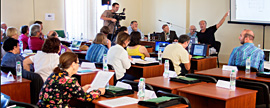The 5th National Seminar of the Musicologists and Folklorists of the USSR was held in Georgia on 27th May – 7th June. The title of the seminar was “Polyphony in Folk Musical Art.” The seminar was organized as a joint venture of the Folklore Commission of the Union of Composers of the Soviet Union (chair – Eduard Alexeev) together with the Union of Composers of Georgia and the Musical-Choreographic Committee of Georgia. Scholarly sessions were organized in different cities of western Georgia. Seminar participants had meetings with numerous local ensembles (according to the official letter, 32 local ensembles), and over 200 songs were performed and recorded by the participants during these performances. Some scholars attended the seminar without the formal paper. Unfortunateley, no papers or abstracts were published. The list of scholars and their papers is as follows:
1. Robert Atayan, Armenia, Erevan. “On polyphony in Armenian folk Music”.
2. Vladimir Goshovski, Armenia, Erevan. a) “Classification of the types of polyphony”; b) “Is heterophony a polyphony?”
3. Elena Murzina, Ukraine, Kiev. “Sociological aspect of the study of group singing”.
4. Nina Gerasimova-Persidskaia, Ukraine, Kiev. “Reflections of the characteristics of traditional polyphony in the manuscripts of the 17th-beginning of the 18th centuries”.
5. Bairam Guseinli, Azerbaijan, Baku. “Element of polyphony in Azerbaijan traditional music”.
6. Grigol Chkhikvadze, Georgia, Tbilisi. “Georgian traditional polyphony and its characteristic features”.
7. Iakov Vitolin, Latvia, Riga. “Drone polyphony in Latvian traditional song”.
8. Nariman Mamedov, Azerbaijan, Baku. “Elements of polyphony in Azerbaijan mughams”.
9. Nikolai Bojarkin, Mordva [Russia], Saransk. “Stylistics of Mordvinian folk songs”.
10. Evsevi Chokhonelidze, Georgia, Tbilisi. “Issues of chordal structures of Georgian folk songs”.
11. Margarita Mazo, Russia, Leningrad. “Polyphonic types from Vologda”.
12. Igor Kniazev, Russia, Moscow. “Performance forms of part-singing according to the materials of fieldwork to the Voronezh region”.
13. Dmitri Pokrovsky, Russia, Moscow. “Some features of the instrumental polyphony in Pskov region”.
14. Valerian Magradze, Georgia, Tbilisi. “Reconstruction of the relict forms of Georgian folk polyphony”.
15. Mindia Jordania, Georgia, Tbilisi. “The ways of emergence of Georgian polyphony.”
16. Tatiana Ganzina, Ukraine, Kiev. Distribution of different types of polyphony on the territory of the Ukraine”.
17. Vladimir Matvienko, Ukraine, Kiev. “Ways of development of polyphony in Ukraine”.
18. Atanazar Matiakubov, Uzbekistan, Tashkent. “Polyphonic thinking in Uzbek folk music”.
19. Bekten Beishenbiev, Kyrgyzstan. “Contemporary forms of Kyrgyz folk polyphony”.
20. Arvidas Karashka, Lithuania, Vilnius. “Peculiarities of polyphony of Lithuanian instrumental sutartines”.
21. Udo Kolk, Estonia, Tartu. “Setu polyphony”.
22. Shaban Shu, North Caucasia (Russia), Maikop. “Problems of polyphony in Adighian instrumental music”.
23. Iulia Krasovskaia, Russia, Moscow. “Linear means with polyphonic combination of choral lyrical wedding song and the bride’s weeping (wedding ritual of Pereslavl-Zelenskogo)”.
24. Larissa Kostriukovets, Belarus, Minsk. “’Kant Polyphony’ in Belarus”.




